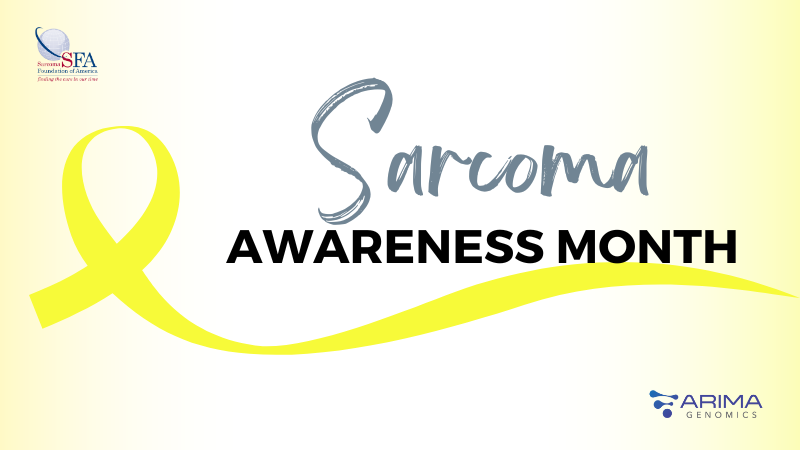July 20, 2023
Share
A Spotlight on Sarcoma Awareness
During Sarcoma Awareness Month, we recognize the importance of not only raising awareness of this rare cancer type, but also of accelerating our understanding of disease mechanisms driving sarcomas in the pursuit of innovative treatment methods. Sarcomas can occur in various parts of the body, including bone and connective tissues, and affect both pediatric and adult populations. Through awareness and rigorous scientific research, we can champion early detection, better treatment, and improved patient outcomes for those battling sarcoma.

At Arima Genomics, our mission is deeply rooted in helping scientists and clinicians better understand human health and disease through the revolutionary lens of 3D genomics. Recently, Arima technology has been used to study the mechanisms of several sarcomas, including rhabdomyosarcoma and Ewing sarcoma, as well as Kaposi’s sarcoma-associated herpesvirus known to cause Kaposi sarcoma.
Below, we spotlight the work of some of these intrepid scientists and clinicians who strive to improve the lives of those affected by sarcomas.
Rhabdomyosarcoma
Rhabdomyosarcoma is a rare cancer that forms in soft tissues like skeletal muscles and hollow organs, typically affecting children and teenagers. In this webinar, Dr. Atif Ahmed shares exciting results from an ongoing collaboration between Arima Genomics and Children’s Mercy Hospital that highlight the potential of 3D genomics in molecular diagnostics.
Hi-C sequencing correctly identified fusion transcripts in alveolar rhabdomyosarcoma and detected novel gene variants in embryonal rhabdomyosarcoma that merit further follow-up. This collaboration highlights the vast potential of 3D genomics to uncover novel genetic drivers in tumor specimens with inconclusive or no previous molecular results.
Ewing sarcoma
Ewing sarcoma is a highly aggressive pediatric cancer. Genetically, Ewing sarcomas are characterized by chromosomal translocations between one gene and a transcription factor, resulting in dysregulation of thousands of downstream targets and oncogenesis.
Research led by Stephen Lessnick and Emily Theisen at Nationwide Children’s Hospital used Arima Hi-C to precisely define the global changes in chromatin structure associated with Ewing sarcoma and further link these structural changes to alterations in gene expression. Specifically, they demonstrated the critical role of EWS/FLI in mediating genome-wide changes in chromatin configuration and that fusion transcription factors serve as master regulators through 3D reprogramming of chromatin. Using Arima technology to explore genome-wide 3D chromatin conformation data, Dr. Lessnick’s team was able to fill significant knowledge gaps in Ewing sarcoma. Learn more about this research on our blog.
Kaposi’s sarcoma
Kaposi sarcoma-associated herpesvirus (KSHV) is a human herpesviruses that is known to cause several diseases, including Kaposi sarcoma, primary effusion lymphoma, and AIDS-related multicentric Castleman disease. KSHV establishes a latent infection in the cell nucleus, but where KSHV episomal genomes are tethered and the mechanisms underlying KSHV lytic reactivation are unclear.
In this webinar, Dr. Yoshihiro Izumiya shared how his lab used Capture Hi-C to understand molecular mechanisms of KSHV reactivation from latently-infected cells. Specifically, the researchers were able to identify KSHV episome tethering sites on host chromosomes and characterize the surrounding nuclear microenvironment of KSHV episomes.
The Arima team stands in awe of the pioneering work of clinicians and researchers as they unravel the mysteries of sarcomas, one discovery at a time. As the scientific community continues to push the boundaries of genomics, we remain committed to improving the lives of individuals affected by sarcoma and working towards a future where this rare form of cancer is conquered.
Did the research highlighted above spark your curiosity? If you are interested in incorporating 3D genomics and Arima technology into your cancer research, please connect with us.
